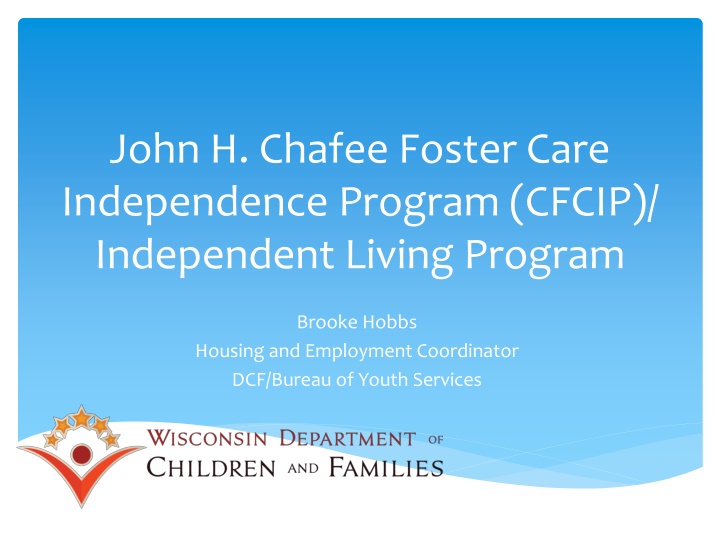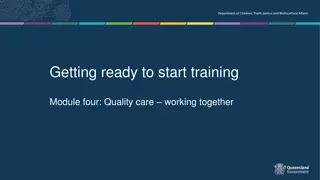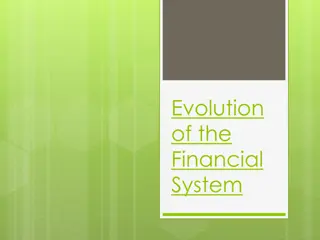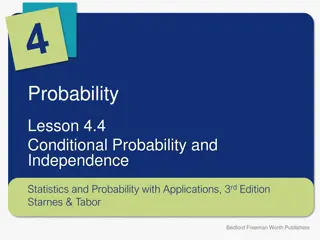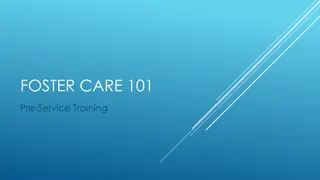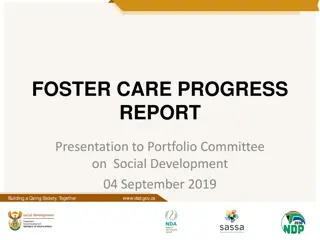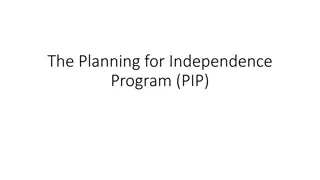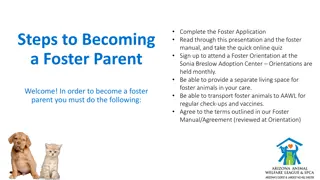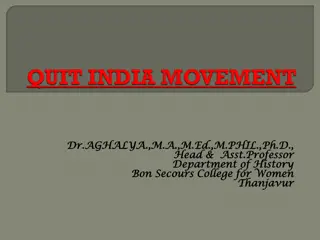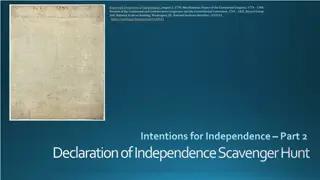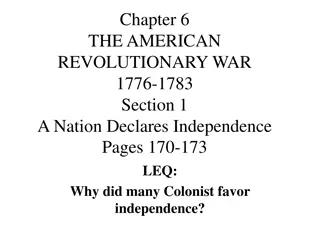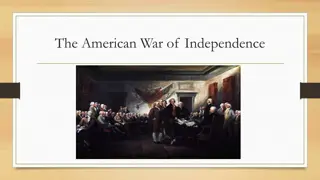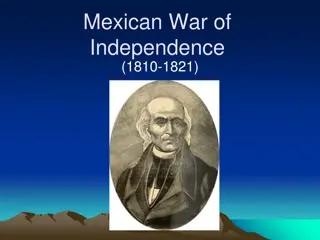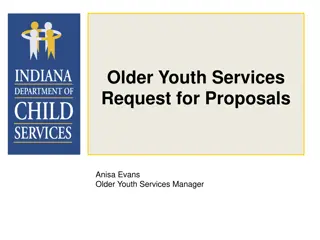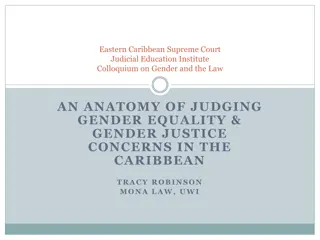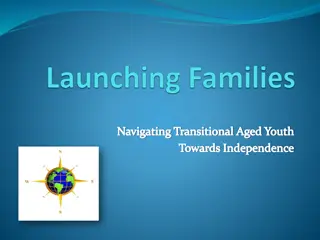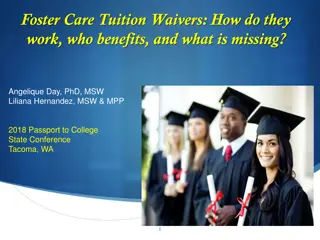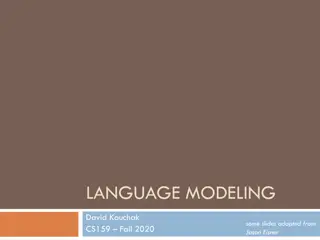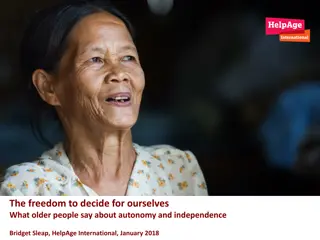John H. Chafee Foster Care Independence Program (CFCIP) Overview
The John H. Chafee Foster Care Independence Program (CFCIP) is a federal initiative established under the Foster Care Independence Act of 1999 to support youth transitioning out of foster care. It provides various services such as job training, housing assistance, education support, and financial aid to help young adults achieve self-sufficiency. The program aims to empower individuals aging out of care by offering guidance, resources, and opportunities for personal growth and independence.
Uploaded on Sep 10, 2024 | 0 Views
Download Presentation

Please find below an Image/Link to download the presentation.
The content on the website is provided AS IS for your information and personal use only. It may not be sold, licensed, or shared on other websites without obtaining consent from the author.If you encounter any issues during the download, it is possible that the publisher has removed the file from their server.
You are allowed to download the files provided on this website for personal or commercial use, subject to the condition that they are used lawfully. All files are the property of their respective owners.
The content on the website is provided AS IS for your information and personal use only. It may not be sold, licensed, or shared on other websites without obtaining consent from the author.
E N D
Presentation Transcript
John H. Chafee Foster Care Independence Program (CFCIP)/ Independent Living Program Brooke Hobbs Housing and Employment Coordinator DCF/Bureau of Youth Services
John H. Chafee Foster Care Independence Program (CFCIP) Background Federal funding source created under the passage of the Foster Care Independence Act of 1999 (Wisconsin receives approx. $2 million CFCIP funds and $700,000 Education and Training Voucher (ETV) funds annually) Each state is required to develop a plan to meet each of the Chafee and ETV provisions
CFCIP Background Cont. CFCIP Requires: All youth likely to age out of OHC receive IL services All youth who age out of care receive IL services up to their 21st birthday Funding for postsecondary education Data collection: National Youth in Transition Database outcomes and services Young people participate directly in designing IL Programs and developing their goals, accepting personal responsibility for achieving independence Provides option for states to: Extend Medicaid for youth who age out of care (has since been required up to age 26 through Affordable Care Act) Room and board assistance (for youth who age out) Ability for youth to have trust fund up to $10,000
CFCIP Background Cont. CFCIP Goals: Help youth make the transition to self-sufficiency by providing the services needed to achieve goals; Help youth receive the education, training and services necessary to obtain employment; Provide personal and emotional support to those aging out of care; Help youth prepare for and enter postsecondary training and education institutions; Provide financial assistance for housing, counseling, health, transportation, employment and education to youth ages 18-21; and Make available Education and Training Vouchers (ETV) for postsecondary education and training.
Use of CFCIP Funds Housing Emergency Funds Job Training Work Related Expenses Education Expenses Work Readiness Stipends Incentives Transportation Life Skills Instruction Insurance Security Deposits Rent Utilities Groceries Basic Necessities Furniture and Appliances Child Care Mentoring Personal Documents
Eligibility Youth between ages 14 (and have attained 6 months in OHC) and 18 are eligible for County IL services Youth who age out of care are eligible up to 21stbirthday* for IL TRA services, Room & Board* and ETV/DCF Scholarship (ETV/DCF funds can be extended to age 23 if participating on their 21stbirthday) Youth who enter Guardianship or Adoption from OHC after their 16thbirthday are eligible up to their 21stbirthday* Badger Care Plus for Youth who age out of care up to their 26thbirthday (due to ACA*) *Federal requirements
Service Responsibility IL Life Skills development ages 14+ while in OHC (includes extended care) responsibility is with: 71 Counties 3 Tribes Division of Milwaukee Child Protective Services Division of Juvenile Corrections Activities required while in OHC (learning by doing): Life skills assessment and development opportunities related to: Home upkeep and maintenance Academic assistance to complete H.S. Work readiness Career exploration/planning Employment assistance/maintenance Budgeting and financial planning Health/Medical Healthy marriage Postsecondary education planning Identification and development of life long permanent connections Securing needed documents for independence
Service Responsibility Cont. Direct Service Responsibility ages 18-21 no longer in OHC is with: Transition Resource Agencies (In 7 Wisconsin regions) Regions 2 and 6 began January 2016 (BAWDB and FCC) Regions 1,5 and 7 began January 2017 (Wood Co., WDB of South Central & WRI) Regions 3 and 4 begin January 2018 Services for Youth 18-21: Life skills instruction Mentoring Safe and stable housing, home upkeep and maintenance Identified income/employment/career planning Health and medical Secondary education completion and postsecondary enrollment and completion Budgeting and financial planning Employment training and work support Healthy marriage Resource and referral Life long connections to caring adults ETV Funds and/or DCF Scholarship
Thank you for your time! Contact info: Brooke Hobbs, Housing & Employment Coordinator WI DCF, Bureau of Youth Services Brooke.hobbs@wisconsin.gov 608-422-6992
